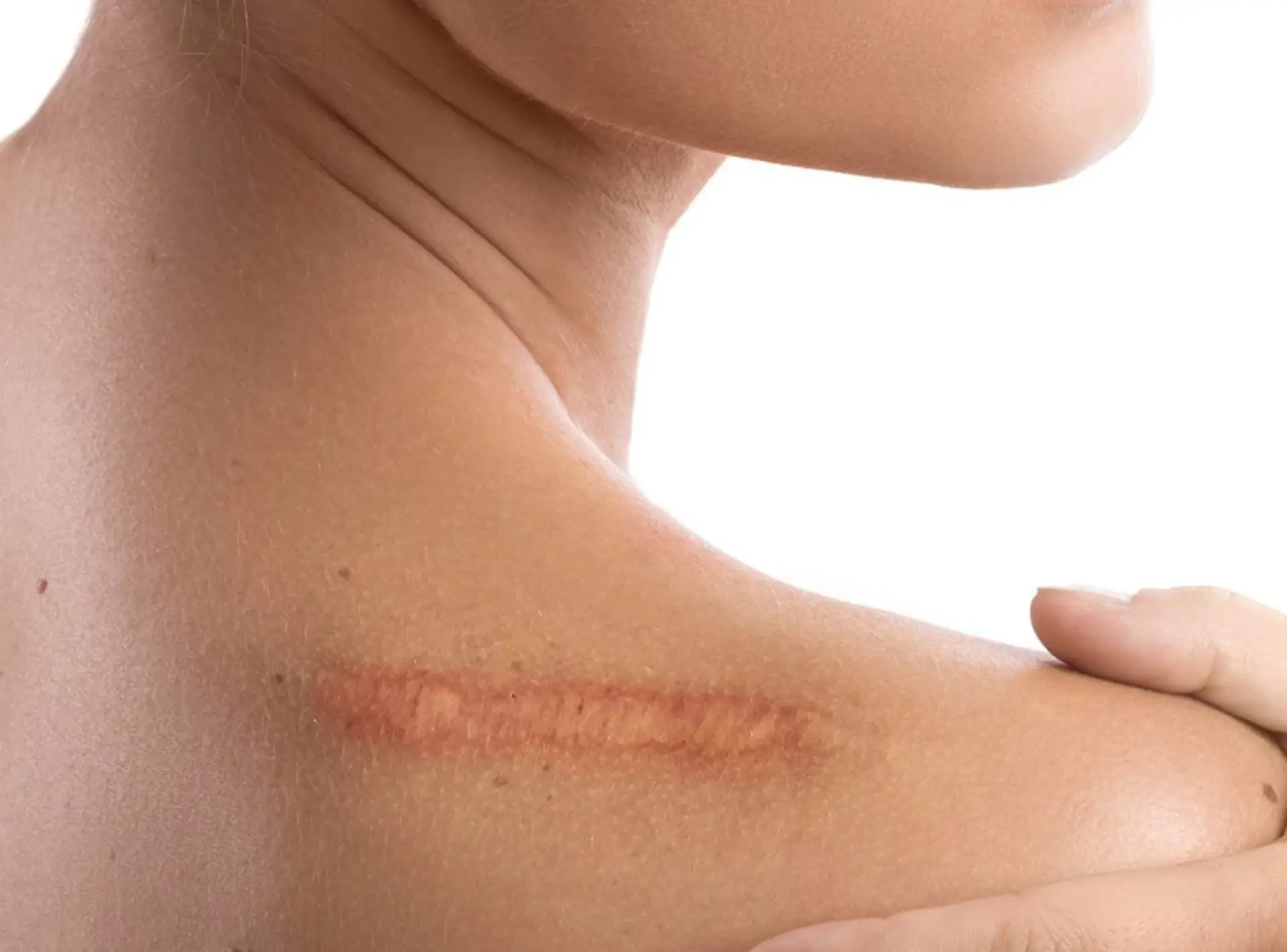Scarring occurs after most plastic surgery procedures. The degree of scar visibility is frequently used by patients to assess the success of their surgery. Surgery will inevitably leave scars, but there are numerous ways to minimize their visibility.
Genetics, skin tone, sun exposure, wound healing, scar tension, the type of sutures used during the procedure, the type of surgery, the presence of infection, nutrition, vitamin and mineral levels, and the type of postsurgical scar treatment are just a few of the numerous variables that can affect the color of scars following surgery.
Selecting a board-certified plastic surgeon who is a Perfect Doctors Clinic member is crucial if you are worried about scarring following your procedure. They have received training to help reduce the visibility of scarring from plastic surgery procedures.
Scar Discoloration In Dubai
Scars from surgery, injury, acne, or burns can all have a negative impact on one’s confidence, but modern scar revision techniques can significantly reduce their visibility. Scar revision in Dubai is a specialized cosmetic procedure that reduces the appearance of scars while improving skin texture, tone, and overall aesthetic appeal. At Perfect Doctors Clinic, skilled plastic surgeons use advanced techniques like laser therapy, surgical excision, dermal fillers, and microneedling to smooth and blend scars with the surrounding skin. Scar removal in Dubai helps reduce the appearance of scars using advanced laser and dermatological treatments that restore smooth, even-toned skin for both men and women. Each treatment plan is tailored to the type, size, and location of the scar, ensuring the best results. Patients can achieve smoother, clearer, and more even-toned skin by utilizing cutting-edge technology and prioritizing safety and precision. Whether your scars are new or old, Perfect Doctors Clinic in Dubai provides effective scar revision to help you regain confidence and restore your skin’s natural beauty.
BOOK AN APPOINTMENT TODAY
Why Does Scarring Occur After Surgery?
One of the most common causes of visible scars following surgery is scar discoloration. In the initial months following surgery, patients usually notice that their scars appear darker than the surrounding skin. It’s crucial to realize that when new scars heal, they frequently appear red, dark, elevated, or rough. It may take up to 20 months for certain scars to completely heal.
If you are still dissatisfied with the way your scar looks after it has completely healed, scar revision might be an option. Although a scar cannot be completely removed, there are nonsurgical and surgical ways to lessen its visibility.
There are four typical processes that can cause this darkening of the scar:
- Extra pigment or scar hyperpigmentation: In the scar area, your skin may produce more pigmentation or melanin. This may persist for a long time or even be permanent. Discoloration can be lessened with treatments like exfoliating peels or skin-lightening creams.
- Bruising or hemosiderin discoloration: This may occur following subcutaneous bleeding or bruises. Hemosiderin discoloration frequently affects the face, lower legs, and lower eyelids. These scars can be lessened with procedures like exfoliation therapy or lasers.
- Skin color differences or skin mismatch: Scars may stand out due to natural skin color variation in places like the pubic area, inner thighs, knees, elbows, breast fold, belly button, and armpits. The scar may exhibit a difference in skin tone above and below the incision line if a significant portion of your skin is removed during your plastic surgery procedure. These variations can occasionally result in noticeable scarring along the incisions made during breast, arm, thigh, or stomach surgery. Combinations of skin lighteners, exfoliating procedures, lasers, and surgery are used as treatments.
- Redness or post-inflammatory hyperemia: New scars may appear red or pink. Your plastic surgeon must be able to differentiate between normal scarring and chronic inflammation, which can result in the formation of keloid. The pulsed dye laser is the gold standard for treating inflammation-induced redness and scar discoloration.
Numerous factors, some of which are under your control and others of which are not, can result in scar discoloration. The way you scar following surgery is frequently greatly influenced by your genetic makeup. Balancing your diet, avoiding excessive strain or stress on your incision line, minimizing direct sun exposure, lowering microbial contamination, and adhering to your plastic surgeon’s instructions for your specific procedure can all help scars heal and become less noticeable.
There are numerous treatments available to help you lessen the appearance of your scars if, even after they have healed completely, you are still unhappy with them. Consult your plastic surgeon about your options for treatment.
Factors That Influence Scar Discoloration
Several factors influence the intensity and duration of scar discoloration. Understanding these factors allows you to take proactive measures to improve the appearance of your scars:
Skin Type And Color
As previously stated, people with darker skin are more likely to develop hyperpigmented scars. In contrast, fair-skinned people may experience hypopigmentation. It’s important to remember that the darker the scar, the longer it will take to fade, and for some people, it may never fully match the surrounding skin tone.
Surgical Site And Technique
The scar’s final appearance can be influenced by the location of surgery and the technique used by the surgeon. Scars from facial surgery, for example, may be more prone to visible discoloration as a result of increased blood flow. On the other hand, surgeries involving the torso or limbs may leave scars that take longer to heal but are less noticeable.
Post-Surgery Care
How you care for your scar during the healing process is critical for reducing discoloration. Following your surgeon’s post-surgical care instructions can make a significant difference. Avoiding sun exposure, moisturizing the scar, and applying silicone sheets or gels can all help to prevent severe discoloration.
Genetics And Healing
Genetics also influences how well your skin heals after surgery. Some people may be more predisposed to developing keloids or hypertrophic scars, both of which can cause discoloration. If you have a history of problematic scarring, you should discuss it with your surgeon ahead of time.
Managing Scar Discoloration
Use Sunscreen
Keeping your scar out of the sun is one of the most effective ways to prevent discoloration. Scars are extremely sensitive to UV rays, which cause them to darken. Using a broad-spectrum sunscreen with an SPF of 40 or higher can help protect your scar from sun damage and prevent future discoloration.
Apply Silicone Gel Or Sheets
Silicone is a highly effective scar treatment. Silicone gel sheets or gel can help hydrate scars, promote healing, and reduce pigmentation. Applying these treatments as directed by your surgeon can help to improve the appearance of the scar over time.
Avoid Scratching Or Picking
It’s critical to avoid irritating the scar during the healing process. Scratching or picking at the scar can cause additional damage and increase the risk of pigmentation issues. Keeping the area moisturized can help to reduce itching and discomfort.
Consider Laser Treatment
If discoloration persists, laser treatments may be an option. Lasers such as fractional laser and intense pulsed light (IPL) can be used to target scar hyperpigmentation and restore skin tone. Your surgeon will be able to recommend the best treatment for your specific situation.
Vitamin E And Other Topical Treatments
Vitamin E oil is often recommended for scar healing. However, research on its efficacy in treating discoloration is mixed. You can also use topical treatments like hydrocortisone creams or hydroquinone to help lighten dark spots. Always consult your surgeon before attempting any new treatment.
MEET THE EXPERT DOCTOR
FAQs On Scar Discoloration After Plastic Surgery
How Long Does It Take For Scar Discoloration To Fade?
Scar discoloration can last anywhere from a few months to one year. Some scars fade on their own, while others require treatments such as laser therapy or silicone sheets to reduce discoloration.
Can I Speed Up The Healing Process Of My Scar?
While there is no way to completely speed up healing, following post-surgery instructions, applying sunscreen, moisturizing, and avoiding sun exposure can all help.
Are There Any Treatments For Dark Scars?
Laser treatments such as fractional laser or IPL are effective at lightening dark scars. Furthermore, silicone gel sheets and topical treatments can help reduce the appearance of hyperpigmented scars.
Is It Normal For My Scar To Look Worse Before It Gets Better?
Yes, this is very common. Scars may appear darker, raised, or more prominent at first before gradually fading and flattening. This is a normal aspect of the healing process.
Can Scars Become Permanent?
Scars are permanent, but their appearance can improve significantly with time. Scar texture and discoloration can be reduced with proper care and treatment.
Best Plastic Surgeon In Dubai For Scar Discoloration
Best Plastic Surgeon In Dubai for scar discoloration is available at the Perfect Doctors Clinic, which is led by the renowned Dr. Perfect Celebrity, a well-known name in aesthetic and reconstructive surgery. Dr. Perfect Celebrity has years of experience and a reputation for excellence. He specializes in advanced scar revision techniques that reduce visible marks and restore smooth, natural-looking skin. The clinic uses cutting-edge technology such as laser therapy, microneedling, and surgical refinement to ensure precision, safety, and excellent cosmetic results. Each treatment is specifically tailored to the patient’s skin type and scar condition, resulting in significant texture and tone improvements. Perfect Doctors Clinic combines artistry and innovation to help patients regain confidence and flawless skin.















































